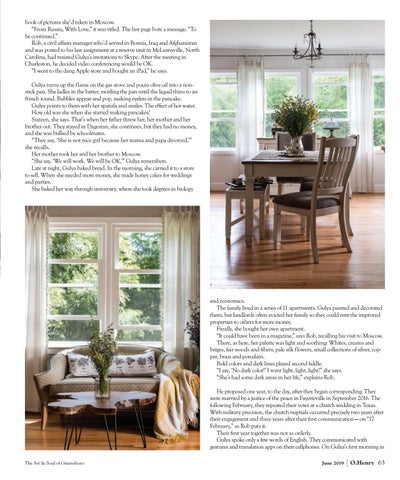book of pictures she’d taken in Moscow. “From Russia, With Love,” it was titled. The last page bore a message: “To be continued.” Rob, a civil affairs manager who’d served in Bosnia, Iraq and Afghanistan and was posted to his last assignment at a reserve unit in McLeansville, North Carolina, had resisted Gulya’s invitations to Skype. After the meeting in Charleston, he decided video conferencing would be OK. “I went to the dang Apple store and bought an iPad,” he says. Gulya turns up the flame on the gas stove and pours olive oil into a nonstick pan. She ladles in the batter, swirling the pan until the liquid thins to an 8-inch round. Bubbles appear and pop, making eyelets in the pancake. Gulya points to them with her spatula and smiles. The effect of hot water. How old was she when she started making pancakes? Sixteen, she says. That’s when her father threw her, her mother and her brother out. They stayed in Dagestan, she continues, but they had no money, and she was bullied by schoolmates. “They say, ‘She is not nice girl because her mama and papa divorced,’” she recalls. Her mother took her and her brother to Moscow. “She say, ‘We will work. We will be OK,’” Gulya remembers. Late at night, Gulya baked bread. In the morning, she carried it to a store to sell. When she needed more money, she made honey cakes for weddings and parties. She baked her way through university, where she took degrees in biology
and economics. The family lived in a series of 11 apartments. Gulya painted and decorated them, but landlords often evicted her family so they could rent the improved properties to others for more money. Finally, she bought her own apartment. “It could have been in a magazine,” says Rob, recalling his visit to Moscow. There, as here, her palette was light and soothing: Whites, creams and beiges, fair woods and fibers, pale silk flowers, small collections of silver, copper, brass and porcelain. Bold colors and dark lines played second fiddle. “I say, ‘No dark color!’ I want light, light, light!” she says. “She’s had some dark areas in her life,” explains Rob. He proposed one year, to the day, after they began corresponding. They were married by a justice of the peace in Fayetteville in September 2016. The following February, they repeated their vows at a church wedding in Texas. With military precision, the church nuptials occurred precisely two years after their engagement and three years after their first communication — on “17 February,” as Rob puts it. Their first year together was not as orderly. Gulya spoke only a few words of English. They communicated with gestures and translation apps on their cellphones. On Gulya’s first morning in The Art & Soul of Greensboro
June 2019
O.Henry 63
